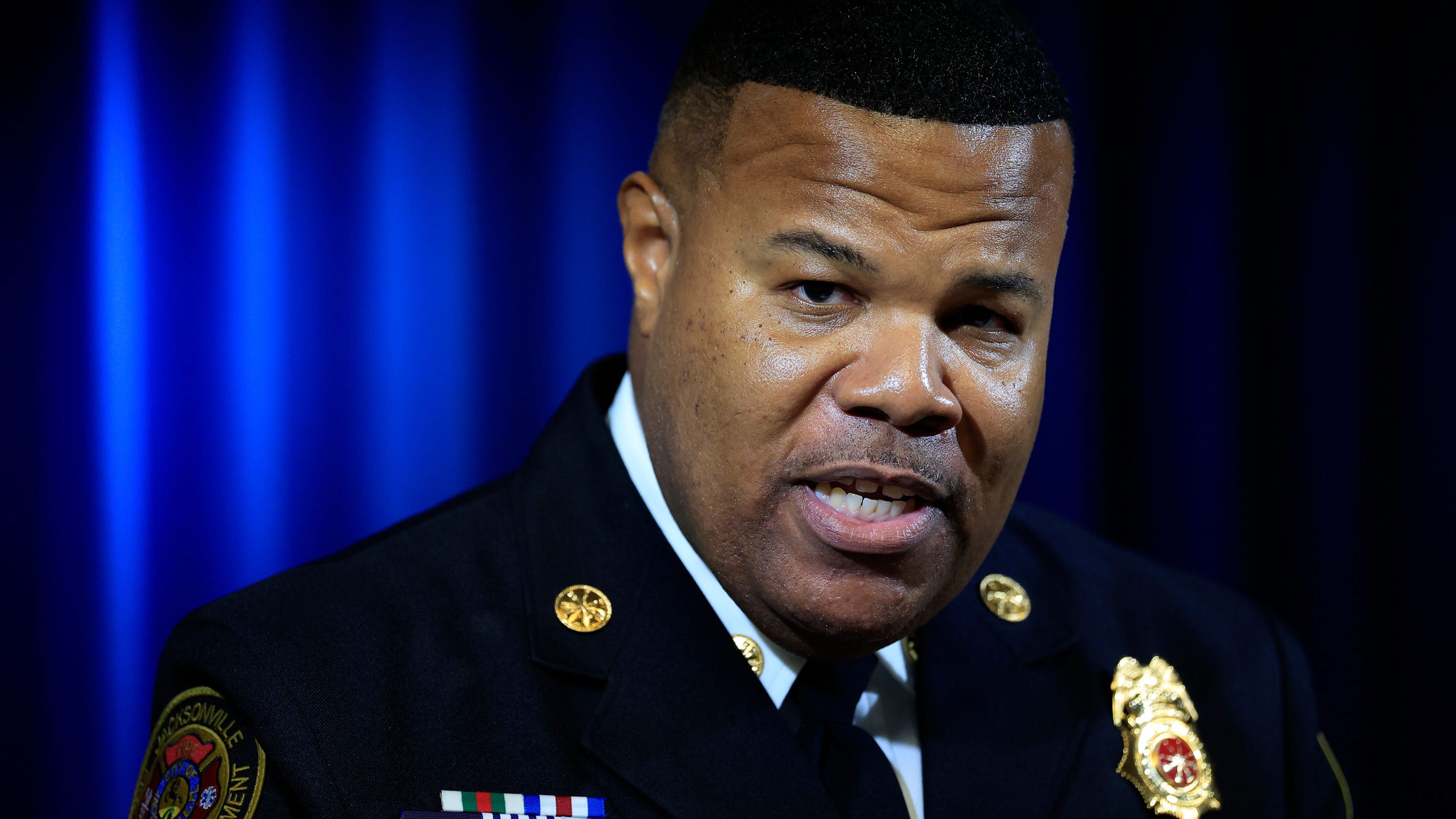
Percy Golden announced at new JFRD fire chief by Mayor Donna Deegan
Percy Golden II was announced as JFRD’s newest fire chief in a press conference hosted by Mayor Donna Deegan.
- Jacksonville City Council is considering using city reserves to create a special fund for public safety.
- The proposal aims to reassure police and firefighters that a proposed property tax cut will not impact their future funding.
- This move would offset a roughly $13 million reduction in property tax revenue from a 1.1% millage rate cut.
- Mayor Donna Deegan’s original budget did not include the tax cut or the use of city reserves.
Jacksonville City Council might pull millions of dollars out of the city’s reserves — once considered untouchable for next year’s budget — so council can put money in a special fund aimed at assuring police and firefighters that cutting the property tax rate won’t hurt public safety in the future.
Mayor Donna Deegan’s proposed budget, which keeps the current millage rate for property taxes, does not take any money from the reserves. Council members on the Finance Committee had also been insistent during their budget hearings that the city’s “rainy day fund” is off-limits.
But as council heads toward a vote Tuesday on making a 1.1% cut in the millage rate for property taxes, several Finance Committee members voiced support for tapping the city’s operating reserves for an amount of money equal to the roughly $13 million that would be eliminated in property tax collections.
A spokesman for Deegan said a “one-time dip into reserves won’t come close to covering our future responsibility to first responders.”
“The only viable solution is to keep the millage rate where it already is — the lowest of any major city in Florida,” spokesman Phillip Perry said.
City Council member Randy White, who is not on the Finance Committee, brought up the proposal for creating the special account for public safety during the committee’s Sept. 3 meeting when it approved the cut in the tax rate.
White said if the city ever gets into a situation “where public safety is hurting,” the money set aside for it will “give our public safety workers — police and fire — the comfort that they won’t be injured in this rollback in the future.”
Finance Committee Chairman Raul Arias said moving the money into that fund wouldn’t be taking anything out of the city’s reserves.
“We’re actually just moving it to a different line item in the reserves,” he said. “So it’s going to stay in the reserves.”
Deputy General Counsel Mary Staffopoulos said that’s not correct. She said it would take money out of the reserves and put it into a separate contingency account designed for public safety.
White said council would have to vote again on spending anything from that account, just as council must vote to take money from the reserves.
“That still does have to come back to the council to be approved so we can treat it in our heads as a reserve,” White said.
“Whatever makes you feel better about it,” Staffopoulos said.
“I’m trying to make everybody feel better,” White said. “I’m trying to make our firefighters and police feel better about it.”
Staffopoulos said if the city creates the special account, it would require super-majority support by two-thirds of council to spend any money from it, which is the same margin for drawing from the reserves.
Finance Committee votes 6-2 for property tax rate cut
The Finance Committee voted 6-2 in favor of the millage rate cut that will head to a vote by the full council on Sept. 9. Ju’Coby Pittman and Rory Diamond voted against it. Diamond said his “no” vote was because he thinks the rate cut should be bigger.
Arias voted for the rate cut along with Nick Howland, Joe Carlucci, Will Lahnen and Ron Salem. City Council President Kevin Carrico joined the Finance Committee in casting his vote for it.
Deegan proposed keeping the current millage at 11.3169 or about $11.32 per $1,000 of taxable property value. The Finance Committee approved a millage of 11.1919 or about $11.19 per $1,000 of taxable property value.
The 1.1% cut in the milllage rate will reduce the city’s property tax collections by about $12.7 million in the 2025-26 budget, according to figures compiled by the City Council Auditor’s Office.
For the owner of a $200,000 home with a $50,000 homestead exemption, the city’s tax bill under the rate proposed by Deegan would be $1,697. Under the Finance Committee’s millage rate, the city tax bill would be $1,678.
After voting for the millage rate cut, Finance Committee members discussed White’s proposal for creating the special account for public safety.
Several Finance Committee members said they would support taking money out of the reserves for it, even as they said the millage rate cut won’t have any impact on the city’s ability to support public safety.
“That’s our No. 1 priority of local government,” Howland said. “But if this is what it takes to bring it over the line and give comfort to public safety (employees) that a tax decrease doesn’t endanger funding for them in the future, I’m more than happy to do it.”
He said the proposed 2025-26 budget still has spending in it that could be cut before public safety is ever affected. He cited the city’s spending to cover health care for poor residents at UF Health Jacksonville and the city’s public service grants and cultural council grants as places he’d cut first.
Diamond said creating the public safety fund will counter contentions by “leftists” that cutting property taxes could undermine police and firefighter services.
He said he can understand why public safety unions representing police and firefighters want to see the establishment of the fund.
“Their job is to protect their members and their members want to know that there won’t be such a crush in future budgets that the budgets can be balanced on their backs,” he said.
Public safety is 51% of $2 billion budget
The Finance Committee has made several changes to Deegan’s proposed budget, but the committee approved her proposed spending levels for the Jacksonville Sheriff’s Office and the Jacksonville Fire and Rescue Department.
Public safety accounts for about 51% of the roughly $2 billion budget that will go before the full council for approval on Sept. 23. The annual increase in spending on the sheriff’s office and the fire department totals $100 million, largely because of historic pay raises for police, firefighters and corrections officers in the second year of a three-year contract.
White initially sought to amend the Finance Committee’s proposed budget to transfer money from the reserves into the public safety account. But since taking money from reserves requires super-majority support by council, the entire budget would have needed at least 13 of 19 council members to vote for it.
To avoid that high threshold, council member Ron Salem suggested voting at the Sept. 9 council meeting on a separate piece of legislation that just involves moving money from the reserves into the public safety fund.
White agreed to that but said he wants City Council to have a vote first on that legislation before taking up the millage rate cut at the Sept. 9 meeting.
Perry said rather than take money from reserves, the council should stick with the current tax rate.
“Council Members continue to try to fix a problem that the Finance Committee created,” he said. “The proposed solution does nothing to address the compounding effect that will put the city in a deeper hole year after year.”
